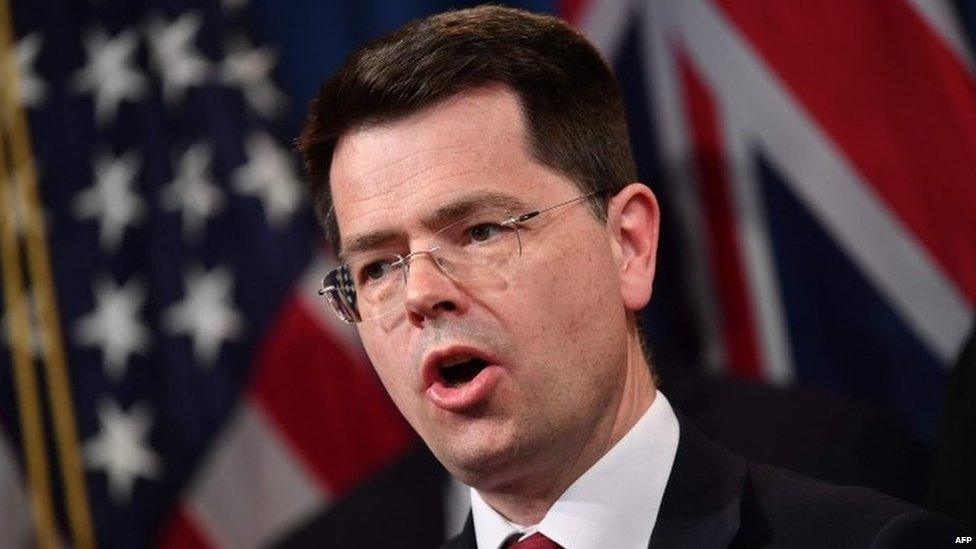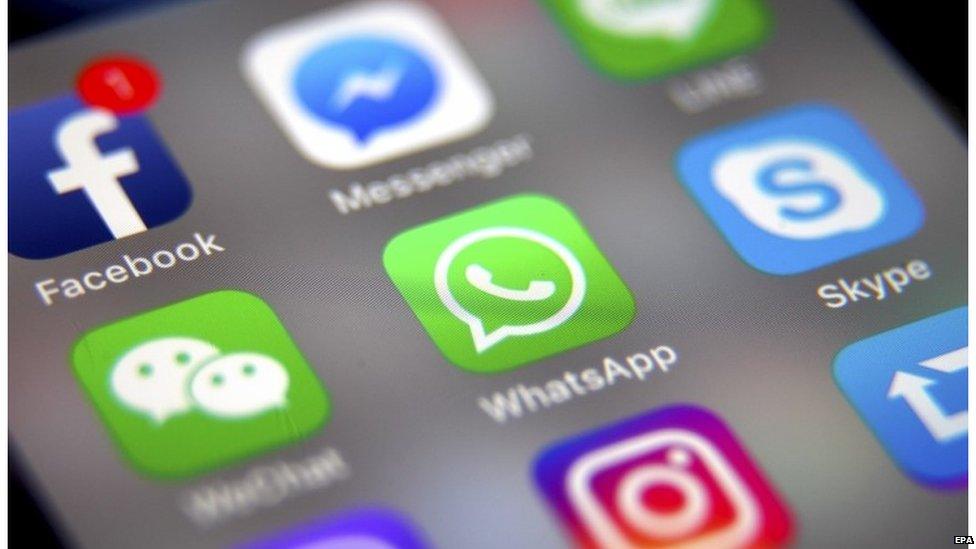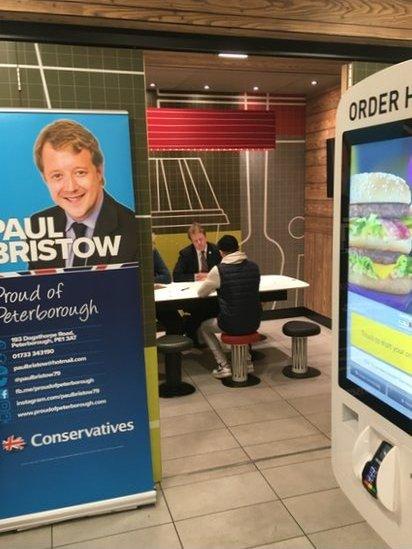Coronavirus: Business as usual for self-isolating MPs
- Published

James Brokenshire is among ministers working from home
Parliament may still be open for business but the coronavirus crisis is rapidly changing life for MPs.
Although only one has so far tested positive - the health minister Nadine Dorries - an increasing number are choosing to self-isolate after either feeling unwell or learning that colleagues they have recently mingled with now have the virus.
New government advice recommends that people isolate if they develop symptoms themselves.
Security Minister James Brokenshire is working from home "as a precaution" for a week after attending a breakfast meeting in the United States with Australian counterpart Peter Dutton, who has since tested positive.
Edward Argar has insisted there has been no-let up in his vital work as a health minister despite voluntarily confining himself to his home, saying "the red boxes are still coming".
Conservative MP Dehenna Davison said she was secluding herself in line with the latest NHS guidance that anyone with a high temperature or a persistent cough should stay away from work for a week.
Posting a picture on Twitter of her laptop, diary and a packet of solpadeine, the Bishop Auckland MP said she was working remotely and in "regular contact" with her team, adding "it's business as usual but just a bit more digital".
Allow X content?
This article contains content provided by X. We ask for your permission before anything is loaded, as they may be using cookies and other technologies. You may want to read X’s cookie policy, external and privacy policy, external before accepting. To view this content choose ‘accept and continue’.

Hundreds of MPs, whether they have shown any symptoms or not, are starting to grapple with how to continue to represent their constituents while scaling back their public engagements - potentially for a prolonged period.
Many, as a first step, have decided to postpone face-to-face constituency surgeries, which typically take place on a Friday and Saturday.
These are, arguably, the most important date in an MP's weekly diary - an opportunity for constituents to raise problems and talk confidentially.

MPs are using different platforms to keep in touch with their constituents
Ms Davison said postponing all face-to-face meetings was the "responsible thing to do" in the current climate.
Others have followed suit, including Bournemouth East MP Tobias Ellwood, who said he had made the "profound" decision to stop seeing constituents and also not to visit his elderly mother, who was recently discharged from hospital.
Although drop-in events are now off limits for many MPs, they are making clear that their constituents can still reach them by phone. Sir Roger Gale, Conservative MP for North Thanet, said he and his staff will "continue to operate as normally as possible within the issued guidelines".
Allow X content?
This article contains content provided by X. We ask for your permission before anything is loaded, as they may be using cookies and other technologies. You may want to read X’s cookie policy, external and privacy policy, external before accepting. To view this content choose ‘accept and continue’.

Rachael Maskell, the Labour MP for York Central, has been in self-isolation for several days but is continuing to deal with local casework over the phone as well as fulfilling her duties as the party's spokeswoman for employment rights.
"It is about making sure we function and keep up our support for people," she told the BBC. "The issues that people have with benefits and housing are not going away."
'Visibility'
The MP, who is currently in London, has not ruled out holding face-to-face meetings after she returns to her constituency. But she expects to "remodel" her working practices, doing more via Skype and other platforms.
"The whole thing about the visibility of MPs - that will change and we will play more of co-ordinating role. We must make sure we are de-escalating this, staying ahead of the curve, and putting in place procedures which will be resilient through the peak of the crisis."

MPs who have self-isolated:
James Brokenshire
Andrew Bridgen
Rachael Maskell
Edward Argar
Dehenna Davison
William Wragg
Alicia Kearns
Alex Sobel
Alex Chalk
Charles Walker
Ruth Edwards
Nadia Whittome

Labour's Lilian Greenwood and Alex Sobel became the first MPs to take action last month, after they attended a Westminster conference where one of the guests tested positive for Covid-19.
Neither of them developed symptoms and they both returned to work.
With events changing by the minute, MPs are having to make very careful judgements and, according to Rachael Maskell, "there have been a lot of discussions on WhatsApp groups about the different decisions" being taken.
Conservative David Johnston, the MP for Wantage, is contacting everyone booked in for his weekend surgery to see if they want to go ahead while his Banbury colleague Victoria Prentis is speaking to elderly and more vulnerable constituents.

Analysis
By Daniel Kraemer, BBC Political Research Unit
One of the priorities for the government in the next few weeks will be to pass emergency legislation to respond to the public health crisis.
To do this - without triggering emergency powers - Parliament must be open but it doesn't have to be fully attended.
Parliament needs to be "quorate" before it votes and make progress on legislation.
This means there need to be at least 40 MPs present. In the Lords, the number is 30.
And it doesn't matter how many for each party are there. So, theoretically, the government could make progress with just 11% of Conservative members in the House.
The Labour Party has repeatedly called for changes to be made to the law to allow people being affected by the coronavirus crisis to have access to statutory sick pay.
This is something that is expected to be contained in government legislation, which ministers say will be published in the coming week.


Peterborough MP Paul Bristow held a surgery in his local McDonalds
Liberal Democrat Tim Farron has said he will hold a special surgery over the phone for those in his Cumbrian constituency who are "worried to go to a public event".
"Naturally with the spread of coronavirus there may be people who would like to chat with me about an issue affecting them but feel uneasy about going to my public advice surgeries," he explained.
Others, including Tories Theresa Villiers and Chris Philp, have signalled they are determined to continue to meet their constituents in person.
Twitter row
The MP for Peterborough, Paul Bristow, has been criticised for going ahead with a surgery on Friday in a branch of McDonalds in the city. He told the BBC he did think about cancelling it but insisted he was following the government's current health advice.
And a row has broken out on Twitter between Ms Dorries and the wife of Conservative colleague Andrew Bridgen, who is self-isolating after developing a cough.
Nevena Bridgen has suggested the minister, who has praised the work of Public Health England, did not tell its contact tracers that she sat next to her husband in the Commons tea room before her diagnosis. This, she claims, has put her own baby and elderly mother at risk.
In response, Ms Dorries insisted she did not sit directly next to Mr Bridgen and had urged him to call the NHS 111 helpline.
Allow X content?
This article contains content provided by X. We ask for your permission before anything is loaded, as they may be using cookies and other technologies. You may want to read X’s cookie policy, external and privacy policy, external before accepting. To view this content choose ‘accept and continue’.
